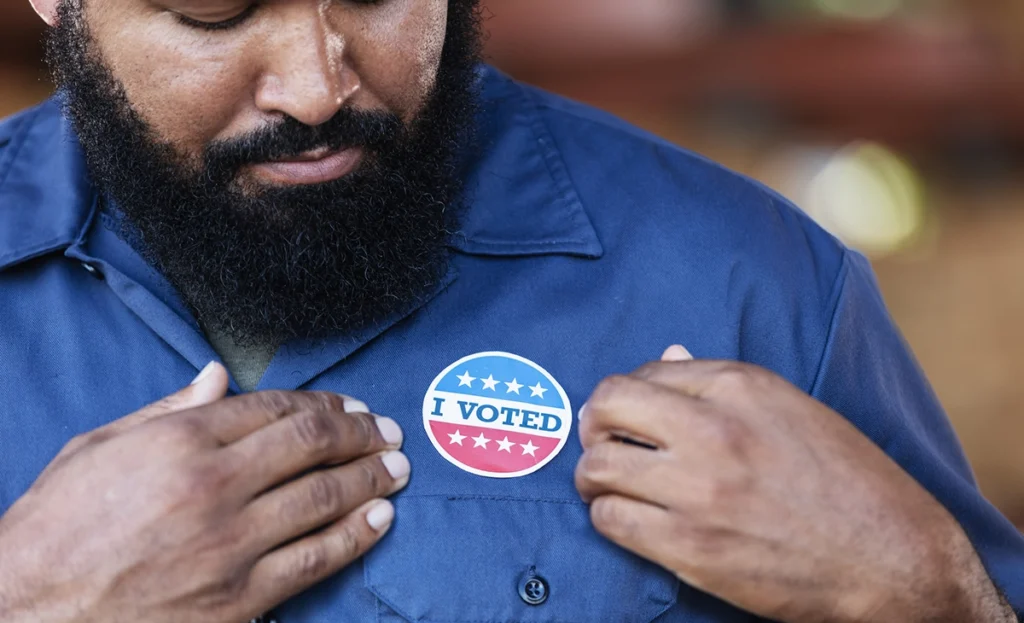Se habla español.
Interpreters available for other languages.
410-706-2781
The ROAR Center is a recognized Center at the University of Maryland, Baltimore

Many people directly impacted by the criminal legal system, like those convicted of a crime, assume they have lost their right to vote, which is often not true. Others, like survivors of domestic abuse who have had to move, may be afraid to vote for fear of making their new home address public. And some people may be concerned that language or accessibility barriers will prevent them from voting.
Voting rights vary from state to state, which creates confusion for millions of people who are unaware of their voting status.
In Maryland, there are some key protections in place for communities that have historically faced voting challenges:
The Maryland State Board of Elections has an Address Confidentiality Program (ACP) that allows voters to have their actual address suppressed and therefore not part of any public record. The ACP urges participants who are eligible voters to apply to vote as an absentee voter. The ACP also urges participants not to use the Motor Voter system because doing so could compromise their actual address records.
All polling places in Maryland must meet federal accessibility standards. If you have concerns about the accessibility of your polling location, contact your local election office for accommodations. Poll workers can assist, or you can bring someone to help you.
Even if you do not have a fixed residence, you have the right to vote as long as you meet the other voting requirements. However, you must provide a mailing address to register to vote. You may provide the address of the place where you regularly receive mail such as a shelter, place of worship, or that of a relative or friend.
Misdemeanor convictions in Maryland: You do not lose the right to vote if you are convicted of a misdemeanor in Maryland. If you are incarcerated for a misdemeanor you should check your voter registration status, register to vote if necessary, and request an absentee ballot from office administrators at your complex. You can vote while awaiting trial for any charge, even if incarcerated, as long as you have not lost your right to vote due to a prior conviction.
Felony convictions in Maryland: If you are convicted of a felony, you lose the right to vote while incarcerated. However, if you are on parole, probation, or have fully completed your sentence, you may register to vote and cast a ballot. Conviction of buying or selling votes results in permanent loss of voting rights.
If your sentence is completed, you may register to vote and cast a ballot, even if you are on parole or probation.
Maryland provides language assistance in certain precincts. If you need a ballot or assistance in a language other than English, check with your polling place to see what accommodations are available.
Voters from marginalized groups, including racial minorities, immigrants, and religious communities, are protected under federal and state laws from discrimination at the polls. If you encounter any form of voter suppression or discrimination, report the incident to election officials and call the Election Protection hotline at 1-866-OUR-VOTE.
The Maryland State Board of Elections website answers frequently asked questions about voting, or you can call them at 1-(800) 222-8683.
You can check your voter registration status online here. If you’re not currently registered to vote, you can register during early voting or on election day. Go to an early voting center in the county where you live during early voting, or go to your assigned election day polling place and bring a document that proves where you live.
If there’s an issue with your voter registration or identification, you can request a provisional ballot. Your vote will be counted once the issue is resolved.
Once you have your plan to vote, it’s time to learn about the important decisions you’ll be making. The Maryland Matters Voting Guide provides comprehensive details on the candidate races and ballot measures you’ll be voting on.
Although Maryland’s voting laws and processes are better than many other states, we urgently need federal legislation, like the John Lewis Voting Rights Act and the Freedom to Vote Act, to strengthen our democracy and enact the comprehensive voting rights reforms needed to ensure that every voice is heard.